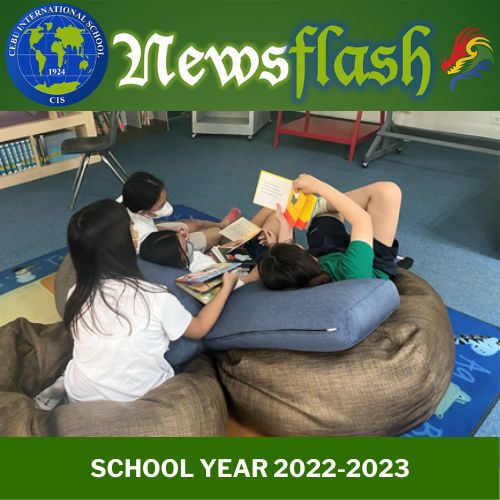
Principal’s Corner
by Mr. Andrew Powell, EY-12 Principal
This morning we held our first face-to-face elementary assembly. To say it was a long time coming would be an understatement. Many of the students 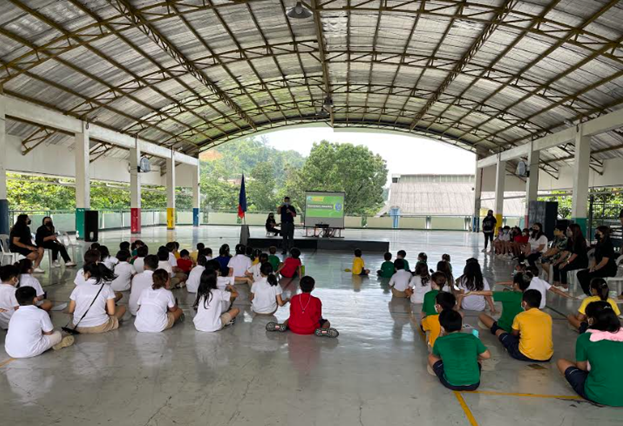 in the elementary school had never been to a face-to-face assembly before or couldn’t remember attending one given the disruptions brought about due to the pandemic. The experience was certainly one to remember. In addition to the introduction of our ES Student Council members, there were various other presentations and the most memorable series of dances put on by our teachers. The atmosphere was fun-filled and served to highlight our unity and commitment to each other.
in the elementary school had never been to a face-to-face assembly before or couldn’t remember attending one given the disruptions brought about due to the pandemic. The experience was certainly one to remember. In addition to the introduction of our ES Student Council members, there were various other presentations and the most memorable series of dances put on by our teachers. The atmosphere was fun-filled and served to highlight our unity and commitment to each other.
We look forward to a gradual return to various face-to-face activities this year, and in doing so I want to highlight the benefits that events such as these provide.
 The opportunity to assemble in one place at the same time to engage in a common experience is powerful. We hope that assemblies, along with other activities such as House Activities Day, our Production, and Alumni Chats serve to cultivate school spirit, instill a sense of belonging and motivate students to make the most of the opportunities CIS has to offer. It also provides us an avenue to showcase Filipino culture and be proud of the many positives of the country and its people.
The opportunity to assemble in one place at the same time to engage in a common experience is powerful. We hope that assemblies, along with other activities such as House Activities Day, our Production, and Alumni Chats serve to cultivate school spirit, instill a sense of belonging and motivate students to make the most of the opportunities CIS has to offer. It also provides us an avenue to showcase Filipino culture and be proud of the many positives of the country and its people.
 School assemblies, whether in person or online, provide students with the opportunity to develop confidence and share their ideas with others. While some students may do this more naturally than others, with the right inspiration, students who are not normally confident in front of others can be inspired to be risk-takers and present their ideas or performance in a respectful environment. Our preference for students to develop and run these events, even in the elementary school, is in keeping with our commitment to nurturing confidence and capacity in our students.
School assemblies, whether in person or online, provide students with the opportunity to develop confidence and share their ideas with others. While some students may do this more naturally than others, with the right inspiration, students who are not normally confident in front of others can be inspired to be risk-takers and present their ideas or performance in a respectful environment. Our preference for students to develop and run these events, even in the elementary school, is in keeping with our commitment to nurturing confidence and capacity in our students.
 Assemblies provide us with an opportunity to share life lessons with our students. Aligning these experiences with the school’s core beliefs and values is especially important and a great way to develop respect for self and others while valuing diversity in all forms. As an IB World School, we also showcase the Learner Profile Attributes and Approaches to Learning which are inherent in our core beliefs.
Assemblies provide us with an opportunity to share life lessons with our students. Aligning these experiences with the school’s core beliefs and values is especially important and a great way to develop respect for self and others while valuing diversity in all forms. As an IB World School, we also showcase the Learner Profile Attributes and Approaches to Learning which are inherent in our core beliefs.
 There is more to school than what goes on in one classroom. It is important that we provide our students with a well-rounded school experience and opportunities to develop and share experiences and understandings. As a school, we promote a diverse range of after-school offerings and believe in the benefit of students engaging with older and younger students. We want our students to participate in fun activities with their peers and in doing so develop their leadership and participate in activities they may not have learned about otherwise. The return of face-to-face experiences such as the Alumni Chats and university/ college visits provides our older students with a window into the wider world and a diverse variety of opportunities that await them.
There is more to school than what goes on in one classroom. It is important that we provide our students with a well-rounded school experience and opportunities to develop and share experiences and understandings. As a school, we promote a diverse range of after-school offerings and believe in the benefit of students engaging with older and younger students. We want our students to participate in fun activities with their peers and in doing so develop their leadership and participate in activities they may not have learned about otherwise. The return of face-to-face experiences such as the Alumni Chats and university/ college visits provides our older students with a window into the wider world and a diverse variety of opportunities that await them.
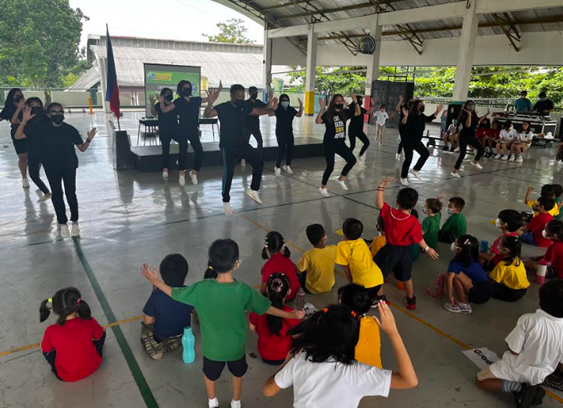
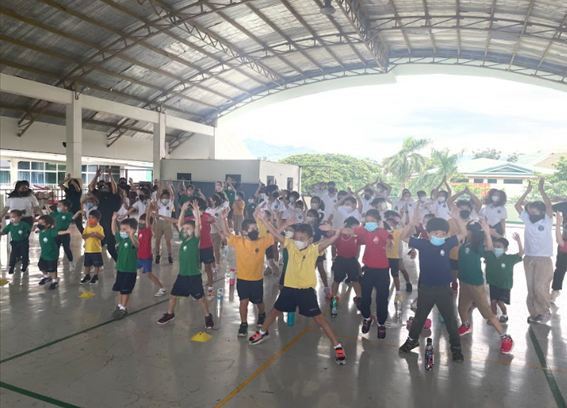
Upcoming events of note
- Aug. 26: School holiday ← Note we have a 4-day long weekend from tomorrow
- Aug. 29: National Heroes Day (Public Holiday) ← Enjoy the break!
- Aug. 30: Parent Coffee Meeting (CIS Annex)
- Sept. 9: Osmena Day (Public Holiday)
- Sep 15: ES Goal Setting and Conferences day (no classes for ES students)
- Sep 16: House Activity Day (HAD) 1 (half day of morning events/home at 11:30am); Teacher Inservice afternoon
- Sept. 20: CIS Corporation Meeting (see info-poster below)
Please refer to the CIS Event Calendar (http://cis.edu.ph/school-calendar/) for the complete calendar of school events.
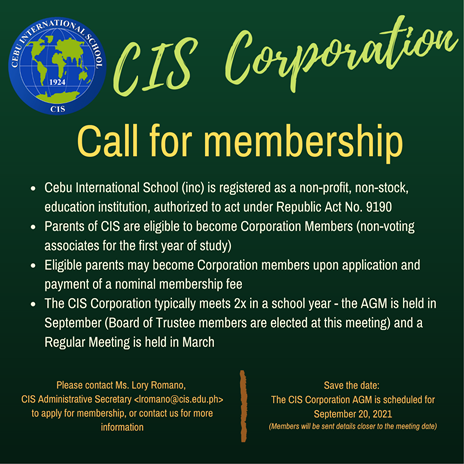
Please note: The deadline to apply for CIS Corporation Membership is August 31, 2022.
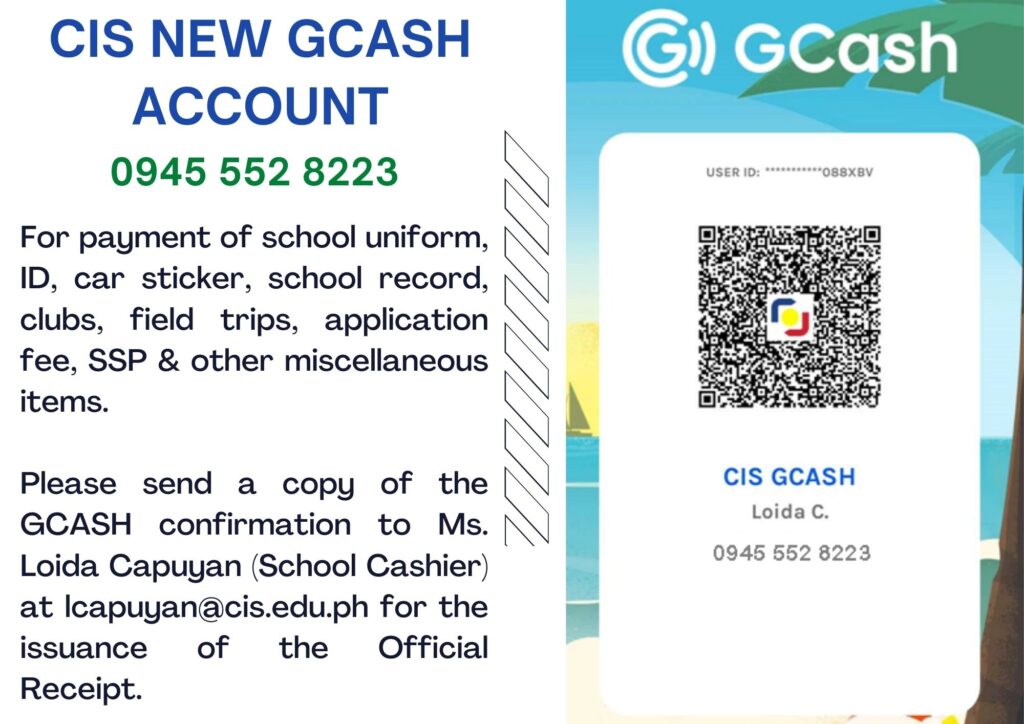
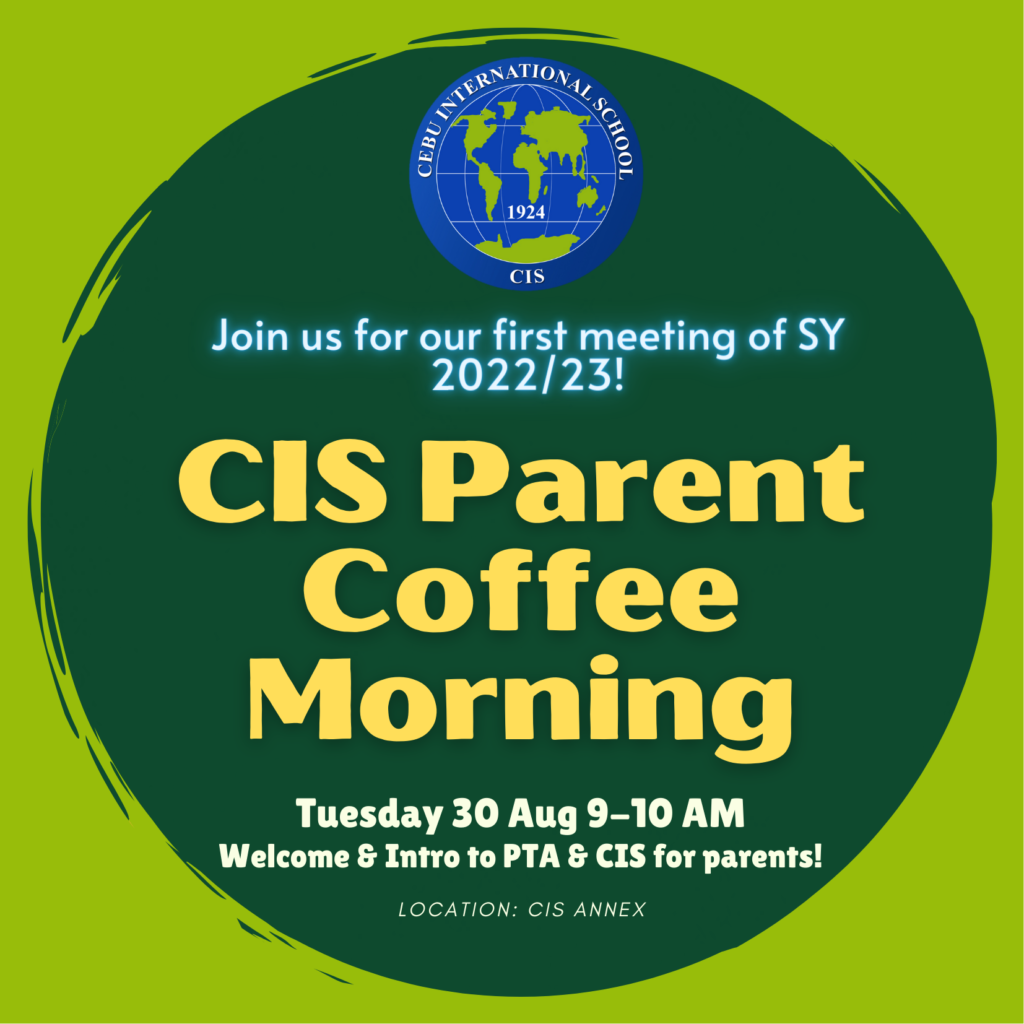
Elem Media Literacy
by Ms. Mary Jean Cordova, Media Literacy Teacher
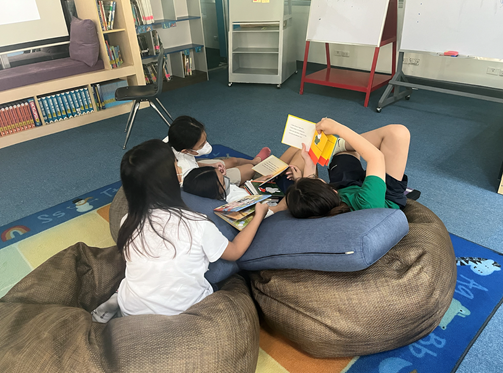 As we kicked off our first unit in Media Literacy, How We Organized Ourselves, students in elementary shared their understanding of Digital Citizenship. Being on remote learning for two years has helped the students develop their media literacy skills. During one of our discussions in class, students in Kinder and Grade 1 shared how they responsibly use their gadgets at home. They shared that they only use their devices on weekends or alternate days with the time limit in mind. When asked what we call those people who used different gadgets to communicate and get information, students identified some of the IB Learner Profile Attributes. According to them, those people are called communicators and thinkers. We will continue to widen our understanding of Digital Citizenship in the following weeks as we explore how we can be responsible and safe online.
As we kicked off our first unit in Media Literacy, How We Organized Ourselves, students in elementary shared their understanding of Digital Citizenship. Being on remote learning for two years has helped the students develop their media literacy skills. During one of our discussions in class, students in Kinder and Grade 1 shared how they responsibly use their gadgets at home. They shared that they only use their devices on weekends or alternate days with the time limit in mind. When asked what we call those people who used different gadgets to communicate and get information, students identified some of the IB Learner Profile Attributes. According to them, those people are called communicators and thinkers. We will continue to widen our understanding of Digital Citizenship in the following weeks as we explore how we can be responsible and safe online.
Class notes during our Media Literacy class with Kinder and Grade 1
Students in Grade 4 shared their individual understanding of Digital Citizenship.
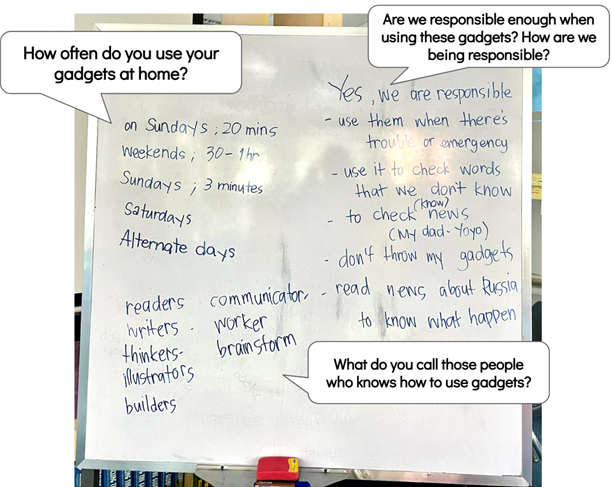
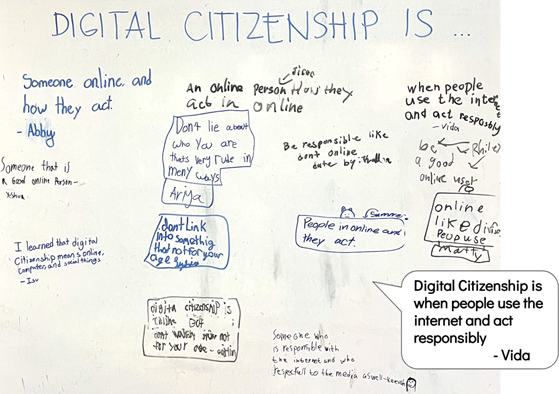
Students in Grade 5 shared their group understanding of Digital Citizenship.
Student in KG1 reading a nonfiction book about reptiles.
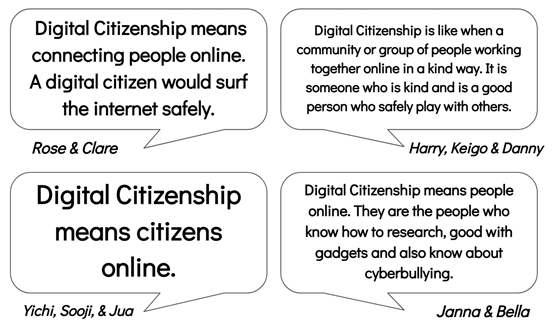
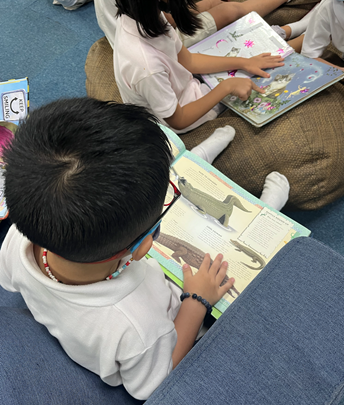
Grade 11: Chemistry
by Ms. Christine Enrile, Chemistry Teacher
As the students start their journey in DP Chemistry, it is important to set them up for success. This is reinforced with knowing the expectations of command terms which are used in instruction and assessments. With this, 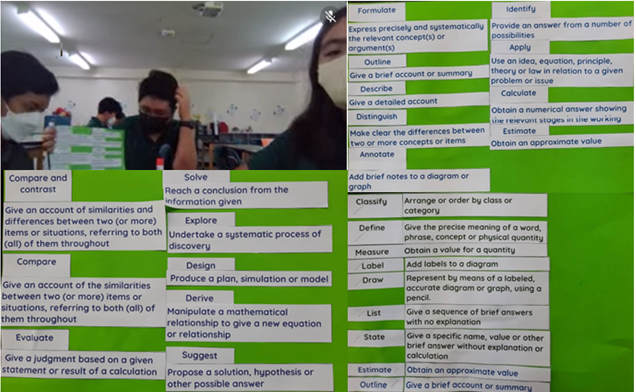 the students started the process of being familiar with the command terms through the collaborative matching type activity.
the students started the process of being familiar with the command terms through the collaborative matching type activity.
It is also important to let the students apply their skills in measurement and data processing since these are used in the prescribed practicals and internal assessment (IA). Through the exploration of determining the density of water at room temperature, the students demonstrated their skills in using the laboratory apparatus, developing a procedure, collecting and processing data. After the discussion and formative tasks on Measurement and Data Processing, the students were then asked to reflect on their practical work and make revisions.
Initial phase: A portion of the lab report is shown.
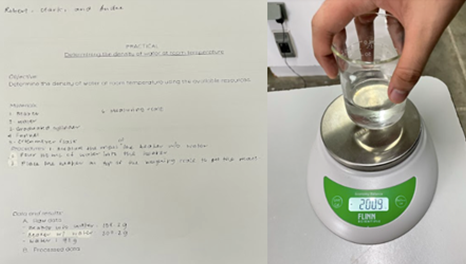
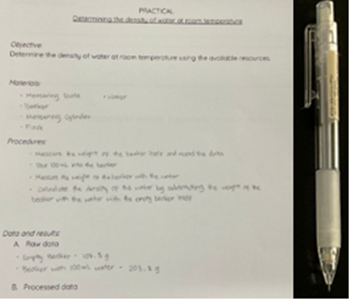
Revision Phase: A portion of the lab report is shown.
Data and results.
A. Raw data
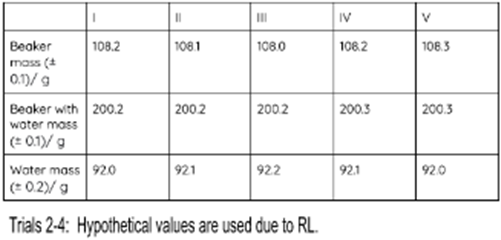
B. Processed data
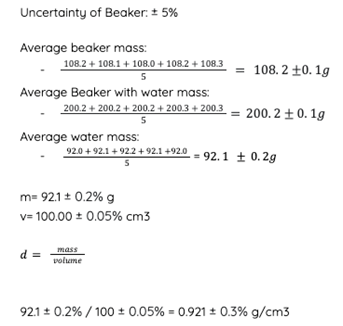
Critical thinking was highly evident throughout the process particularly in the revision phase. The students were able to apply their understandings and skills to make empirical data more scientific and valid.
Here are the lesson takeaways from the students.
Reflections
Robert, Clark and Andre
Fitz and Lyle
MHS Spanish
by Mr. Antonio Melgar, Spanish Teacher
Hola, ¿qué tal? In Spanish in Grades 6 and 7 students are having fun while discovering how to describe a person based on physical appearance but also using personality traits like intelligence, kindness and hard work. They are using the newly acquired vocabulary to describe themselves, classmates, peers and people relevant to them either at home or school, and at the same time they are emphasizing how important is to show respect and kindness for people that are different to them. Because at the end of the day, we are all different.
Grade 8 and 9 students are working on discussing the dangers of the social media, and the challenges that it poses for them. As part of the unit, they are considering how they can protect themselves from anything that can be perceived as a menace to their integrity. Discussion goes from rules and regulations to permissions and what can be posted and what is not allowed, depending on the social media platform and their ethical values. In order to achieve that, they are reading and listening to audio intended for native speakers. Please see how one student has extracted the relevant information from this video file.
CIS Centennial: 1924 – 2024
by Ms. Jenny Basa, Alumni Liaison
Did you know that Cebu International School is turning 100 in 2024? Can you recognize the locations of the 3 campuses of CIS?
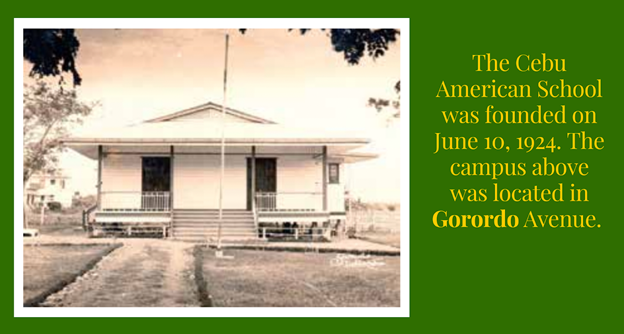
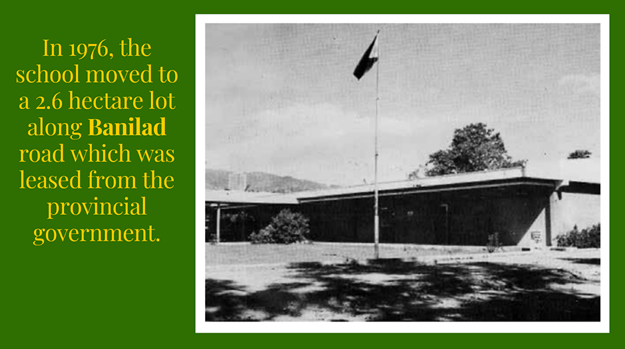
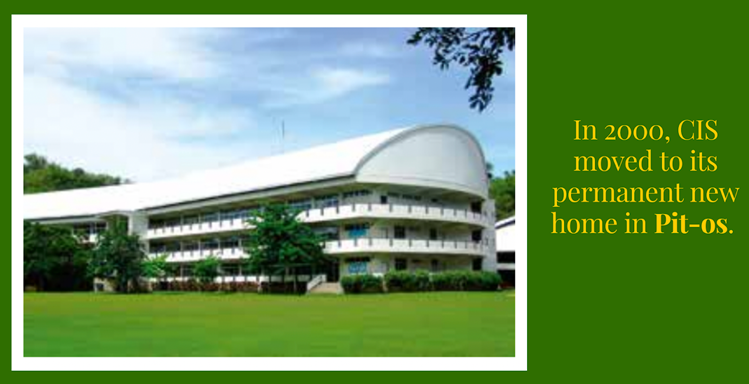
College/Careers Counselor Corner
by Ms. Jenny Basa, College/Careers Counselor Corner
College Events (Virtual and Face to Face)
DATE
August 29
Monday
9:00AM
Link to register
EVENT
Temple University – Japan Campus (online session)
Learn about the application process, scholarships, financial aid and engage in a Q&A session.
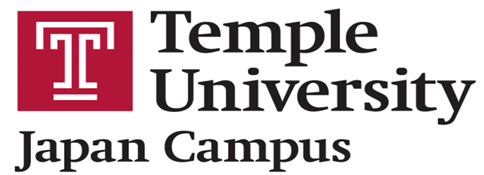
September 6
Tuesday
9:15-10:00AM
Canteen Annex
University of Sydney (Australia) – In-person visit with the university rep for an information session with Q&A.
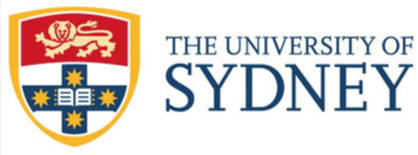
September 13
Tuesday
9:15 – 10:00am
Venue: Canteen Annex
Savannah College of Art & Design (USA, France)
In-person info session with the college rep from SCAD. Learn about their programs, the application process, scholarships, portfolio preparation and more.
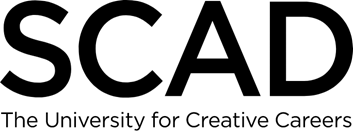
September 27
Tuesday
9:15 – 10:00am
Venue: Canteen Annex
York College Pennsylvania (USA) – In-person info session with the college rep with Q&A.
October 4
Tuesday
Venue & Time – To be confirmed
New York University – Abu Dhabi – In-person info session with the NYUAD rep. Since this is during the quarter break, the venue & time will be confirmed later next month.
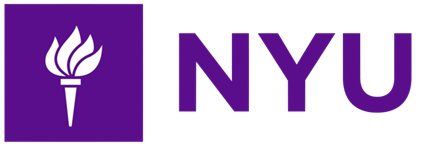
October 11
Tuesday
9:15 – 10:00 AM
Canteen Annex
Hawaii Pacific University (USA) – Info session with the university rep with Q&A.
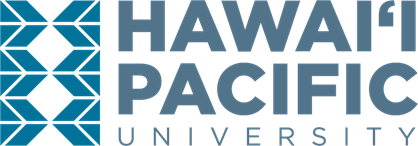
Test dates labeled Digital means that students will bring a device to the test center and take the exam using their device. The College Board may provide devices for test-takers who do not have access to a device. All test-takers for Digital SATs are still required to report physically to the test center to take the test.
To register for the SAT, you may click on this link. If you need assistance or have any questions, please feel free to email Ms. Jenny Basa at jbasa@cis.edu.ph.
| SAT Test Date | Deadline for Registration, Changes and Regular Cancellation |
| August 27, 2022 | July 29, 2022 |
| October 1, 2022 | September 2, 2022 |
| December 3, 2022 | November 3, 2022 |
| March 11, 2023 (Digital) | February 24, 2023 |
| May 6, 2023 (Digital) | April 21, 2023 |
| June 3, 2023 (Digital) | May 19, 2023 |



